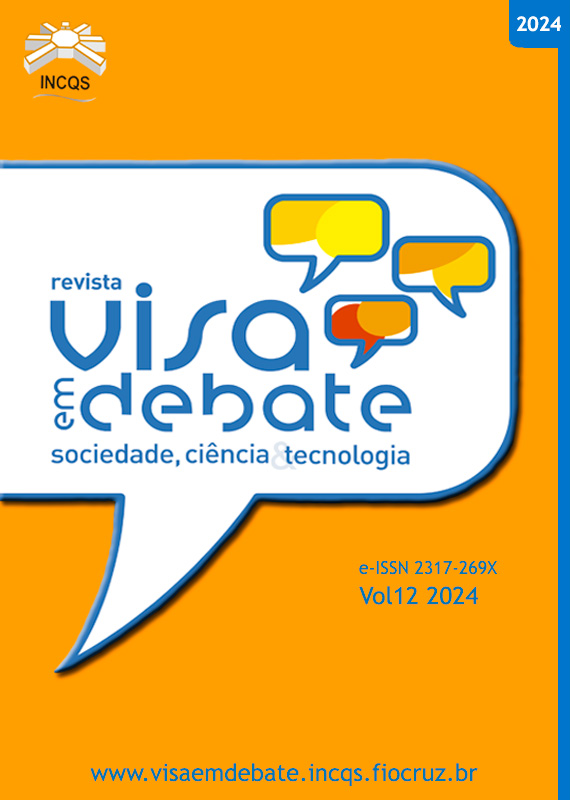Prevention and control of healthcare-associated infection and SARS-CoV-2 in the work context of dentists of Family Health Strategy in a large municipality of the Brazilian Northeast
Vigil Sanit Debate, Rio de Janeiro, 2024, v.12: e02190 | Published on: 04/09/2024
DOI:
https://doi.org/10.22239/2317-269X.02190Keywords:
SARS-CoV-2, COVID-19, Personal Protective Equipment, Dentistry, Primary Health CareAbstract
Introduction: The health emergency related to the COVID-19 pandemic in Brazil and around the world, brought the need to reassess and implement new measures to protect the worker health. Objective: To analyze the work context of dentists from the Family Health Strategy (ESF) regarding the prevention and control of Healthcare-associated Infections (HAI) and SARS-Cov-2. Methods: This cross-sectional study was conducted with primary care dentists in Fortaleza, Ceará, in Northeast Brazil. In order to identify the sample of dentists from the ESF, a sample calculation was carried out, and 103 dentists participated. The selection of participants was carried out through a systematic probabilistic sampling. Data collection was carried out from June 8 to August 23, 2022, through an electronic questionnaire, which was accessed and completed electronically by a computer or smartphone, with questions that evaluated the offer of Personal Protective Equipment (PPE), equipment and infrastructure necessary for the good performance of the profession and the health conditions of workers in this context. A descriptive analysis was performed. Results: A total of 29.1% of respondents belonged to COVID-19 risk group. Overall, most participants had taken both doses and one (46.6%) or both (50.2%) booster doses and were vaccinated against influenza (81.6%). There is no 100.0% adherence to any of the PPE recommended by health authorities or by dentists. The availability of sufficient quantities of PPE in the service was always below the recommended level, and, in all situations, the quality of the PPE was considered questionable, potentially compromising work safety. Deficiencies related to the provision of equipment, devices, and infrastructure necessary for good performance were also verified. Conclusions: Despite the good vaccination practices of professionals, deficiencies in the process of implementing standards that provide for good practices in dental procedures were identified and needed to be implemented to avoid the risks inherent in the profession.
Downloads
Downloads
Published
Issue
Section
License
Copyright (c) 2024 Health Surveillance under Debate: Society, Science & Technology

This work is licensed under a Creative Commons Attribution 4.0 International License.
COPYRIGHT ALLOWANCE The author (s) hereinafter designated as the ASSIGNOR hereby assign and transfer, free of charge, the ownership of the copyrights related to this ARTICLE to the Vigilância Sanitária em Debate: Sociedade, Ciência & Tecnologia (Health Surveillance under Debate: Society, Science & Technology) – Visa em Debate, represented by FUNDAÇÃO OSWALDO CRUZ, established at Av. Brasil, nº 4365, Manguinhos, Rio de Janeiro, RJ, Brazil, CEP 21045-900, under the conditions set out below: (a) The terms and conditions set forth in this Agreement shall apply to the following: 1. The ASSIGNOR declares that they s(he) is (are) the author (s) and owner (s) of the copyrighted property of the ARTICLE submitted. 2. The ASSIGNOR declares that the ARTICLE does not infringe the copyrights and / or other property rights of third parties, that the disclosure of images (if any) has been authorized and that they s(he) assume(s) full moral and / or property liability for its content, before third parties. 3. THE ASSIGNOR assigns and transfers all copyrights relating to the ARTICLE to the ASSIGNEE, especially the rights of editing, publication, translation into another language and reproduction by any process or technique. The ASSIGNEE becomes the exclusive owner of the rights related to the ARTICLE, and any reproduction, totally or partially, is prohibited in any other means of publicity, printed or electronic, without prior written authorization from the ASSIGNEE. 4. The assignment is free and, therefore, there will be no remuneration for the use of the ARTICLE by the ASSIGNEE.






